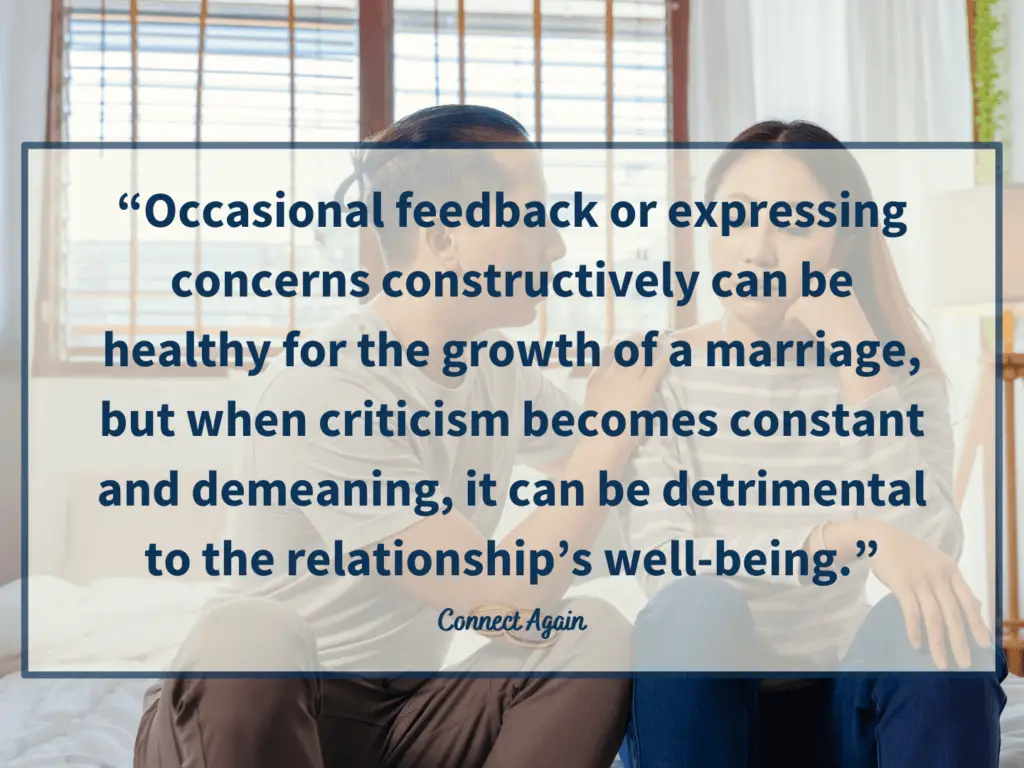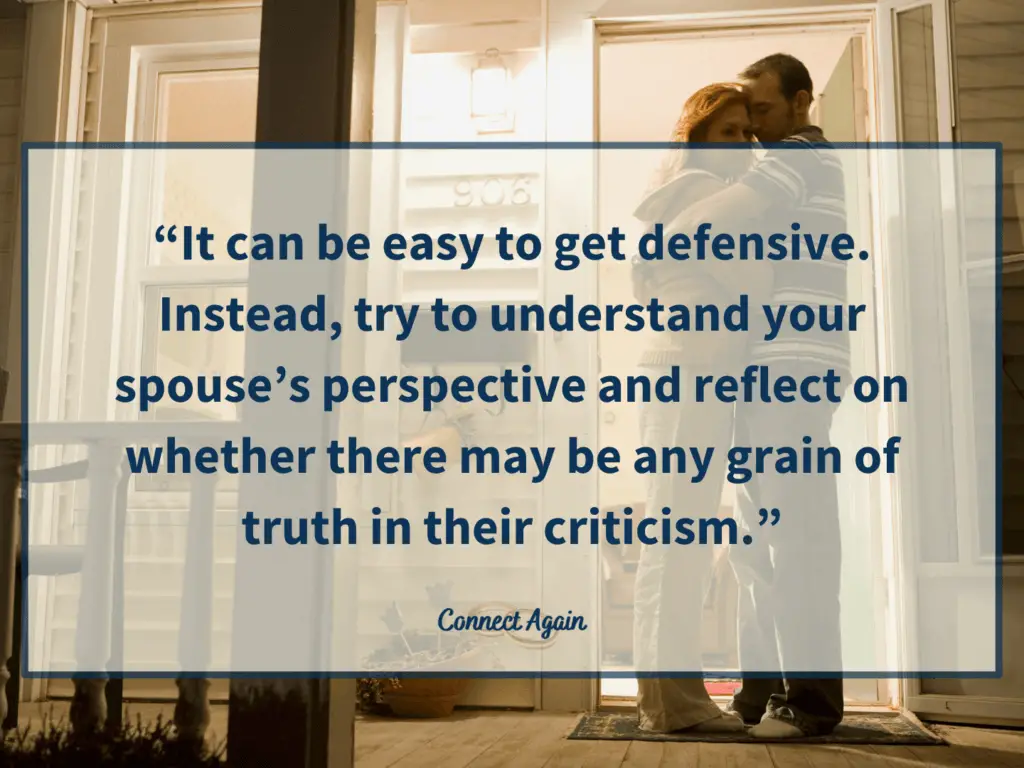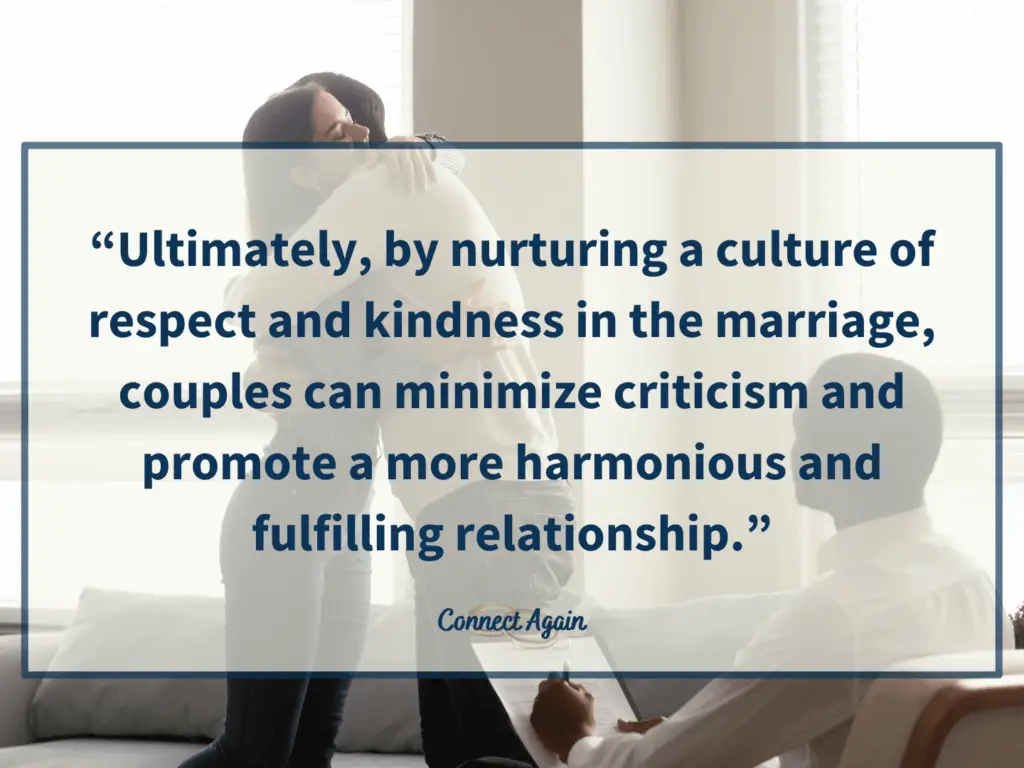Criticism in marriage can quickly escalate and make you feel inadequate. After 12 years together and 8 years of marriage, my husband and I have developed a harmonious solution to stop criticism in our marriage. I hope you find the tips as useful as we do!

- What is criticism in marriage?
- Why is criticism in marriage so common?
- The difference between a valid complaint and criticism
- How to stop criticism in marriage
- Effects of criticism in marriage
- What is toxic criticism in a relationship?
- Constant criticism
- Frequently asked questions
- Final thoughts on criticism in marriage
- Pin for later!
What is criticism in marriage?
Criticism in marriage is the disapproval or dissatisfaction towards one’s spouse. It involves pointing out perceived flaws, mistakes, or shortcomings in the partner’s behavior, character, or choices. T
his can manifest in various ways, such as:
- Making negative comments
- Nitpicking
- Constantly finding fault in the other person’s actions.
Criticism often stems from a place of frustration, disappointment, or a desire for change within the relationship.
What is a critical spouse?
A critical spouse tends to focus on the negative aspects of their partner’s behavior and tends to overlook or minimize the positive aspects. They may frequently criticize their spouse’s appearance, habits, or decisions. This can lead to a decline in their self-esteem and overall relationship satisfaction.
A critical spouse may exhibit a heightened sense of superiority, believing that their way is the only correct way and expecting their partner to conform to their expectations.
It is important to note that occasional feedback or expressing concerns constructively can be healthy for the growth of a marriage, but when criticism becomes constant and demeaning, it can be detrimental to the relationship’s well-being.

A critical spouse is someone who consistently finds fault with their partner and focuses on their negative attributes, often highlighting their flaws and shortcomings. A critical spouse may be quick to point out mistakes and failures, while rarely acknowledging or appreciating their partner’s positive qualities. This behavior can create a toxic dynamic in the relationship, eroding trust and intimacy over time.
Living with a critical spouse can be emotionally draining and detrimental to one’s self-esteem. They may engage in name-calling, sarcasm, or put-downs, making their partner feel inadequate and worthless.
This constant barrage of criticism can lead to feelings of resentment, insecurity, and even depression. Being in a relationship with a critical spouse can hinder personal growth and happiness as it becomes challenging to fulfill their partner’s ever-changing expectations.
Why is criticism in marriage so common?
Criticism is an all too common occurrence in marriage, and there are several reasons behind its prevalence.
Spouses know each other the best…
Firstly, the nature of a marital relationship often leads to an increased level of familiarity. This results in spouses becoming more aware of each other’s flaws and shortcomings. As a result, it becomes easier for individuals to scrutinize and critique their partner’s behavior, leading to a pattern of criticism.
Stress can take a toll
Stressors of daily life can take a toll on a marriage, making it even more susceptible to criticism. A demanding work schedule, financial strain, or the challenges of raising a family can create tension and irritability within the relationship.
When individuals are under pressure, they may be more likely to lash out and express their frustration through criticism, further exacerbating the issue. In such cases, criticism can become a means of venting personal frustrations and seeking a temporary release from the stressors of life.
Recognizing these factors is crucial in addressing and preventing the harmful effects of criticism in a marriage.

The difference between a valid complaint and criticism
When couples find themselves facing issues in their marriage, it is not uncommon for them to voice their concerns. However, there is a significant difference between making a valid complaint and resorting to criticism.
A valid complaint is constructive and solution-oriented, aimed at addressing a specific issue without attacking the character of the other person. It focuses on the behavior or action that is causing distress, rather than making negative assumptions about the partner as a whole.
In contrast, criticism tends to be unhelpful and negative in nature. It goes beyond expressing dissatisfaction and often takes on a personally attacking tone.
Unlike a valid complaint, criticism does not aim to find a resolution or improve communication. Instead, it can breed resentment and defensiveness, hindering the ability of both partners to engage in problem-solving conversations and navigate conflicts effectively in their marriage.
To maintain a healthy and thriving relationship, it is essential for couples to be mindful of their communication style and strive to express themselves in a constructive manner when addressing concerns.

How to stop criticism in marriage
When it comes to stopping criticism in marriage, there are a few key strategies that couples can try.
Communication
First and foremost, open and honest communication is essential. Both partners should feel comfortable expressing their needs and concerns without resorting to criticism.
By addressing issues in a respectful and constructive manner, couples can work towards finding healthy solutions. Remember, it’s important to listen actively and show empathy towards your partner’s perspective.
Here are some signs your marriage is having communication problems. If this speaks to you, you’ll want to work on this as well as the criticism.
Create a positive environment
Fostering a positive and supportive environment can go a long way in reducing criticism. Focus on highlighting each other’s strengths and accomplishments, rather than dwelling on flaws or mistakes.
Showing appreciation and gratitude for your partner’s efforts can create a sense of validation and encouragement. Small gestures of kindness and acts of affection can also help to strengthen the connection between partners.
Ultimately, by nurturing a culture of respect and kindness in the marriage, couples can minimize criticism and promote a more harmonious and fulfilling relationship.

Every once in a while, my husband an I will write down a list of things about each other. They help us focus on the good about the other person. Here are some ideas you can do yourself:
- List 5 things you are grateful for about your spouse
- List 5 of your spouse’s character traits that you love
- List 5 favorite memories of you and your spouse
When you are the one criticizing: How to stop criticizing your partner
If you find yourself in the role of the criticizer, it’s important to take a step back and evaluate how your words and actions are impacting your relationship.
To stop criticizing your partner, start by practicing empathy and understanding. Put yourself in their shoes and try to see things from their perspective.
Remember that no one is perfect, including yourself, and everyone has their own unique strengths and weaknesses. Instead of focusing on what they’re doing wrong, make a conscious effort to acknowledge and appreciate their positive qualities.
By shifting your attention towards their strengths, you can create a more positive and supportive environment in your marriage.
When you are being criticized: How do you deal with criticism in a marriage?
When you find yourself on the receiving end of criticism in your marriage, it can be a challenging and emotionally charged situation.
Have an open mind
The first step is to approach the conversation with an open mind and listen to what your partner is saying. It can be easy to get defensive. Instead, try to understand their perspective and reflect on whether there may be any grain of truth in their criticism.
Taking a moment to pause and gather your thoughts before responding can help to prevent knee-jerk reactions and heated arguments.
Communicate
It is important to communicate with your partner about how their criticism affects you. Express your feelings in a calm and non-accusatory manner. By fostering open and honest communication, you can jointly address any issues within your marriage and work towards a healthier, more supportive relationship.

Reflect
Once you have listened to your partner’s criticism and had a chance to process your emotions, it can be helpful to engage in self-reflection. Take the time to honestly evaluate your own actions and behaviors within the context of the criticism.
Consider whether there may be any aspects of your behavior that can be improved upon or changed for the better. This does not mean that you should accept unjust or unwarranted criticism, but rather that self-reflection can help you grow as an individual and as a partner.
Seeking the support and guidance of a therapist or marriage counselor can provide a safe space for both of you to discuss your concerns and work through any underlying issues that may be contributing to the criticism in your marriage.
Come up with a plan
How can your spouse express their feelings without it sounding like criticism? Have a discussion about how your spouse normally communicate these feelings to you.
Come up with a plan that you both agree on. The next time your spouse needs to voice a concern or feeling about you, how would you both be comfortable receiving it?
Forgive
Remember that forgiveness is important. Learn to forgive your spouse after criticism happens. Learn to see any progress they make toward ending the criticism.

Effects of criticism in marriage
Here are some of the many effects of criticism in marriage:
- It creates an environment of negativity and hostility
- The criticized partner may start to feel unworthy or inadequate
- Low self-esteem and a decrease in self-confidence for the criticized partner
- A diminished bond between the couple
- A lack of trust and intimacy that are essential for a strong marriage
- Resentment
- A lack of communication
- Less intimacy
In addition, criticism in marriage can also escalate conflicts and arguments. When one partner constantly points out faults and shortcomings, it can lead to defensiveness and counter-criticism from the other spouse. This cycle of criticism and defensiveness can quickly spiral out of control, resulting in heated arguments and an overall toxic atmosphere within the relationship.
These heightened tensions can make it difficult for partners to find effective resolutions to conflicts, as they are more focused on defending themselves rather than listening and understanding each other’s perspectives. As a result, the relationship may become stuck in a negative pattern, causing long-term damage to the marital bond.

What is toxic criticism in a relationship?
Toxic criticism in a relationship occurs when one partner consistently belittles, demeans, or humiliates the other through their words or actions. It goes beyond constructive feedback and becomes a means of control or manipulation.
This type of criticism is characterized by its persistent nature, targeting the core aspects of a person’s identity or self-worth. It can leave the recipient feeling constantly judged, invalidated, and emotionally drained.
In a relationship, toxic criticism can manifest in various ways, such as:
- Mocking or ridiculing one’s appearance, intelligence, or abilities
- Making sarcastic or passive-aggressive remarks
- Undermining achievements
- Constantly finding fault in their actions.
The intention behind toxic criticism is often to establish power and dominance over the other, creating an unhealthy and toxic dynamic that erodes trust, intimacy, and overall relationship satisfaction.
Constant criticism
We need to discuss constant criticism as it’s own category. If the criticism being given isn’t necessarily toxic, but is constant, then this is an issue and needs to be addressed.
Constant criticism examples
Here are some constant criticism examples that can happen in a marriage. This is not an exhaustive list but is meant to get you thinking about your own marriage. Do you do these to your spouse? Or do you feel that your spouse does these to you?
- Only focusing on mistakes
- Constantly correcting speech or behavior
- Always placing blame on the other
- Setting unrealistically high expectations and then getting upset when they aren’t met
- Questions the other’s decisions
- Comparing to others and pointing out flaws
Constant criticism and lack of affection
Constant criticism can easily lead to a lack of affection. A lack of affection could be the cause of the criticism (used as a defense mechanism) or a result of it. Either way, it’s important to note that criticism is usually accompanied by other issues in the marriage.
Here are some signs your marriage lacks emotional intimacy and how to build it.

How do you deal with a spouse who constantly criticizes you?
You can approach constant criticism in the same way as regular criticism. But there’s one big exception: voice your concern with the frequency of the criticism.
Effects of constant criticism in a marriage
Constant criticism in a marriage can have detrimental effects on both partners, leading to emotional and psychological distress. The persistent pattern of finding faults and pointing them out creates a hostile environment, where negativity overshadows any positive aspects of the relationship.
The criticized spouse often loses their self-esteem and self-worth, constantly feeling inadequate and unappreciated. This can lead to a decline in overall happiness and satisfaction within the marriage.
Constant criticism erodes the trust and communication between partners. Instead of open and honest dialogue, criticism breeds defensiveness and resentment. The criticized partner may become guarded and reluctant to share their thoughts and feelings, fearing judgment or disapproval.
This breakdown in communication can create a disconnect in the marriage, making it challenging to resolve conflicts or find resolutions. Ultimately, constant criticism can contribute to a toxic cycle of negativity, gradually breaking down the foundation of trust and love in the marriage.
If you need extra help with criticism in your marriage, you might want to reach out for more help. Did you know that online couples counseling can be an easy and effect way to seek help? Read my review here.
Frequently asked questions
“What do you do when your wife constantly criticizes you?”
First reflect on why she is criticizing you. Is there any truth to it? Could she maybe voice her concerns better? Do your best to give your wife the benefit of the doubt.
Regardless, you need to have a talk with your wife about how the criticism makes you feel. Be open and honest, but not judgemental.

“Why does my wife doubt everything I say?”
There are a lot of reasons why you could be feeling this way. Let’s dive into a couple of them.
In my many years of marriage, I have found that I’m particularly sensitive about certain topics. It someones might seem like my husband is commenting on certain things I do. But really, I’m just overshadowing what he’s saying with my own personal doubts.
Take a look at your own concerns and see if you may be doing the same thing.
It’s also possible that you have let your wife down in the past and she’s lost trust in you. If this is the case, you need to show her that you are capable of earning her trust back.
“Is my husband critical or am I sensitive?”
Both are absolutely possible. Try giving your husband the benefit of the doubt. Is there any truth behind the criticisms? If so, you could still have a talk with your husband about phrasing his concerns in a nicer tone so that you don’t feel so sensitive about it.
If it’s constant and makes you feel bad, have a conversation with your husband about how his criticism makes you feel.
“What does it mean when a man criticizes a woman”
As mentioned above, criticism doesn’t necessarily mean a man is looking down on a woman. Stop and consider if there’s any truth to the criticism. Try to see things from his point of view.
Final thoughts on criticism in marriage
It’s not uncommon for couples to find themselves in a pattern of criticism, where one partner constantly points out the flaws and shortcomings of the other. While it may seem like a harmless habit at first, constant criticism can take a toll on a marriage and erode the trust and connection between partners.
Remember, addressing criticism in a marriage takes effort and understanding from both partners, and it is a shared responsibility to work towards a healthier and happier relationship.
You’ll also want to check out this post on conflict resolution in marriage. It’ll give you a lot more strategies to help you handle different issues as they come up with your marriage.
Pin for later!



About the Author
Melissa is a wife of 8 years and mother to 2 young kiddos. She has a passion for helping couples prioritize and strengthen their marriage after having kids. She knows firsthand how difficult it can be to connect with your spouse when you have little people running around, demanding all of your attention.
